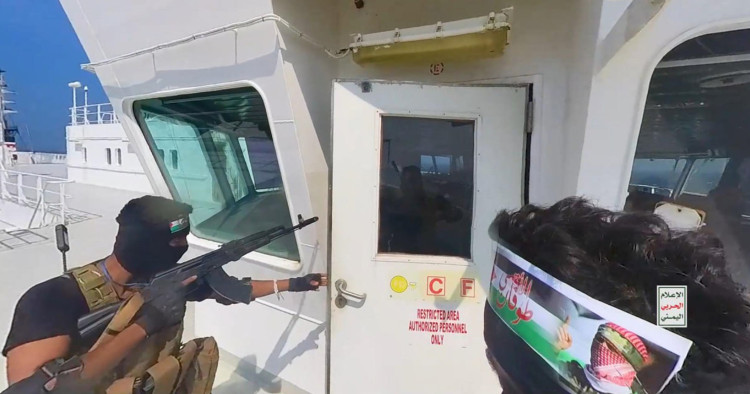The following article is part of MEI’s special series, “The Houthis: Iran’s Most Distant Ally,” which analyzes the dynamics behind the Iranian-Houthi relationship, identifies the interests and challenges faced by both sides in maintaining their cooperation, charts their impact on regional security, and offers policy recommendations for how the US and other governments should respond.
Since the outbreak of the Israel-Hamas conflict in October, Yemen’s Houthi rebels have sought means to capitalize on the war in Gaza to raise their profile, enhance their pan-Arab legitimacy, and burnish their credentials both domestically and in the region. Initially, they claimed that their missile and drone strikes were intended to target Israel itself, but these efforts proved ineffectual, as the weapons fell short of their targets or fell on Egyptian territory. Subsequently, the Houthis decided on a fallback strategy of attacking international shipping passing off the coast of Yemen through the Bab al-Mandeb strait and Red Sea. Although these efforts also proved largely unsuccessful, they nevertheless have had some impact as several shipping companies have decided to avoid transiting their cargos through the Red Sea and are, instead, sending their ships around the longer and more costly Cape of Good Hope route. If this situation continues for a prolonged period, it could have negative consequences for the global economy.
In their effort to insert themselves into the Gaza conflict, the Houthis believe their actions will strengthen their support base at home while also cementing their movement more firmly into the Iranian “Axis of Resistance.” Domestically, strong support for Palestinian rights has long been an article of faith for most Yemenis. Thus, the Houthis will see their operations in support of the Palestinians in Gaza as gaining the approval of even those Yemenis who are not generally sympathetic to the Houthi domestic position. Their advantage is greater as their stance is at odds with the internationally recognized Yemeni Presidential Leadership Council, which has been largely silent on the Gaza conflict and focused its statements on the threat posed by the Houthi Red Sea attacks rather than defending the Palestinian cause.
Regionally, the Houthis will see their Red Sea aggression as placing their movement on an equal footing with Hezbollah, on the front lines of pro-Iranian resistance to Israel and the United States. It remains unclear to what extent the regime in Tehran is directing or encouraging the Houthi attacks on international shipping. Senior US officials have become increasingly explicit in warning that the Iranians, at the very least, are providing the Houthis with the materiel support and tactical intelligence needed for their attacks, if not actually guiding or directing them. There has long been a view among observers, including senior Yemeni political leaders, that Iranian investment in the Houthis was a reflection of the potential it saw for Houthi interdiction of shipping in the Red Sea as a significant strategic asset and a parallel to its own ability to threaten shipping in the Strait of Hormuz, should its confrontation with the US threaten to break out in armed conflict. In that context, current Houthi attacks on international shipping can be interpreted as an Iranian “proof of concept.”
It’s also unclear whether the Houthis see their defiance of US warnings against their Red Sea operations as testing US red lines or consciously seeking to provoke a US military response beyond the defensive measures of Operation Prosperity Guardian. The Houthis may well calculate that, having withstood seven years of Saudi aerial bombardment over the course of the Yemeni civil war, it’s unlikely that a US air assault on Yemeni targets would inflict more substantial damage or that any damage to its equipment or facilities could not be quickly repaired or replaced. Moreover, a US (or other) attack on Houthi military targets would validate, from the Houthi perspective, their propaganda that they are fighting on the front lines in support of Palestinians and that their operations are succeeding in threatening US and allied interests. Thus, the group’s leader, Abdul-Malik al-Houthi, declared in a late-December televised address that the Houthis “will not stand idly by if the Americans are tempted to escalate further and commit foolishness by targeting our country or waging war against it.”
The US has a number of intersecting interests at play in the current confrontation with the Houthis. Beyond protection of international shipping and freedom of navigation, the Biden administration has prioritized avoiding the spread of the Israel-Hamas conflict beyond Gaza and not taking steps that would undermine the possibility of a negotiated end to the Yemeni civil war. With those interests in mind, the US should avoid giving Abdel-Malik the propaganda victory he’s seeking and maintain the largely successful defensive measures of Operation Prosperity Guardian.
Amb. (ret.) Gerald Feierstein is a Distinguished Senior Fellow on U.S. diplomacy at the Middle East Institute (MEI) and Director of its Arabian Peninsula Affairs Program.
Photo by Houthi Movement via Getty Images
The Middle East Institute (MEI) is an independent, non-partisan, non-for-profit, educational organization. It does not engage in advocacy and its scholars’ opinions are their own. MEI welcomes financial donations, but retains sole editorial control over its work and its publications reflect only the authors’ views. For a listing of MEI donors, please click here.













